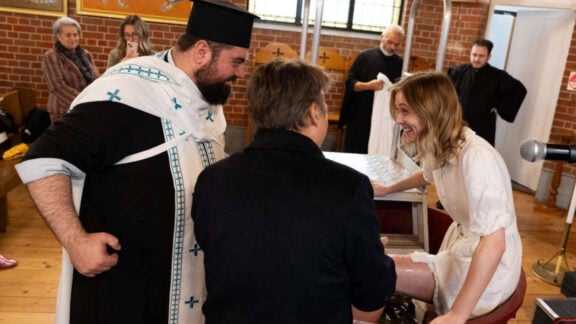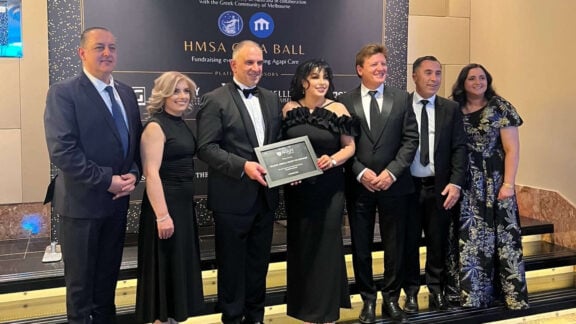On the agenda of the Greek Community of Melbourne tomorrow, is a discussion about domestic violence prevention, which was organised in collaboration with White Ribbon Australia.
The aim of this webinar is to raise awareness within the community, to give insight and a deeper understanding of this crisis. As keynote speaker, domestic violence victim/ survivor, Simone O’Brien, will recount her own devastating experience, and discuss the red flags and attitudes and behaviours that are at the root cause of this issue which has reached social epidemic levels.
In an interview with Penny Marangos, Victorian Committee Board Member with White Ribbon Australia, we delved into the crisis of domestic violence, its root causes and the strategies of primary prevention that are being implemented, in an effort to “break” the stereotypes that exist and eventually the vicious cycle of violence that currently results in one woman a week murdered by her intimate partner.
“It’s an alarming statistic,” Ms Marangos told Neos Kosmos. “But at the same time, the defense forces are better equipped to identify domestic violence cases and report on them.”
READ MORE: One third of migrant and refugee women experience domestic violence, major survey reveals
“Prevention strategies are essential if we want to see change”
“Compared to 10 years ago, we have so many services now available to women fleeing family violence. Services providing respite and immediate crisis support for women and children from domestic violence situations. These services are absolutely vital.
“White Ribbon’s key function is primary prevention, addressing the root causes of domestic violence, in an effort to bring about permanent and sustained change.
“Across schools nationally, White Ribbon implemented ‘The Breaking the Silence’ programme (which will be reinstated), through which, children were educated about what constitutes a successful and respectful relationship, and how to set boundaries for behaviours that are disrespectful and threatening. Equally important though, is what is happening at home. What role modelling is presented to children at home and is it congruent with the messages young people are learning at school?”
“Gender inequality is the main cause of domestic violence”
“The main cause of violence against women is gender inequality. We see this demonstrated in the low representation of women in corporate leadership. Women account for less than 10 per cent of CEO positions in Australia. There is a significant gender pay gap, with women earning 85 per cent of what men earn (ABS Statistics). Many organisations have ‘maternity leave’ policies but no ‘parental leave’ scheme, which positions women as the primary caretakers and solely responsible for child rearing. On domestic duties, women spend, on average, four times the amount of time men do. The gender stereotypes that position women as submissive nurturers and men as tough, leaders, responsible and rational. What this inequality creates is a power imbalance within relationship dynamics and a sense of entitlement in some men. When this power imbalance/ dynamic is transferred into their interpersonal relationships, it makes some men think it is okay to disrespect women and in extreme cases commit homicide. This is not okay!”
READ MORE: The holistic approach to ending family and domestic violence in ethnic communities
“We need men involved in these discussions”
“This space is flooded with women’s voices. We want to talk about it. Why? Because our voices have been suppressed. But we need men to be engaged in the narrative because without them we cannot make the changes needed in workplaces, the community, schools and homes.
“It is understandable that men have been largely absent from the discussion, it is because men hold privilege within society and pertaining to this cause. Many men are unconscious of their privilege and entitlement and how it might play out. This is why we need to engage with men through education and awareness programs to create the opportunity of deep self reflection on important questions such as; “where is there privilege in my life and how does it play out in terms of power dynamics; at work, home and in the community? What do we need to do to change this?”
“I am very hopeful”
“I see a lot of change, especially in the emerging new generation. Young people have greater awareness because the narrative is integrated into the school curriculum, and I am hopeful that they will channel what they have learnt into the choices they make as adults. Young people are across the issue, which is likely to result in shifts in gender stereotypes and societal expectations around men and women. The numbers are not shifting – but that might be a matter of time.”
READ MORE: Greek mother’s desperate plea for help, after fleeing domestic violence
The free webinar will livestream on 24 August at 7pm. You can watch it on Facebook https://fb.me/e/XrRz2QiU or register your participation on the following link www.trybooking.com/BTKMI
Ηelplines
- Call Safe steps – 1800 015 188
- 1800 Respect 1800 737 732
- Lifeline 13 11 14
- Kids Helpline 1800 551 800
- MensLineAustralia 1300 789 978









